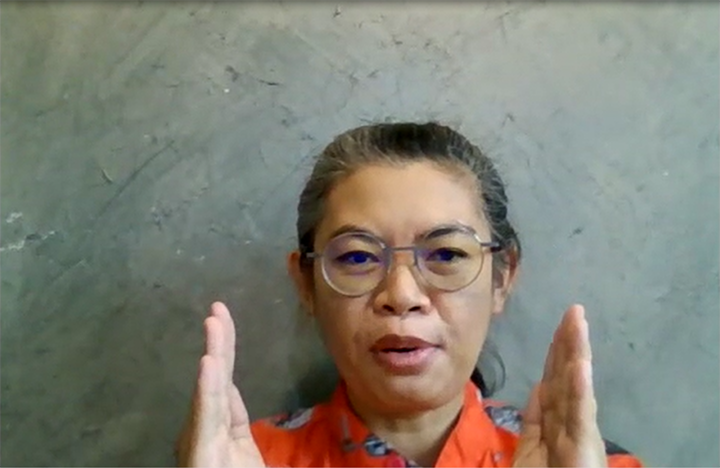ジャールナン・パンタチャート インタビュー
2022.10.8 (Sat)
タイ出身のジャールナン・パンタチャートが隣国・ミャンマーの俳優たちとの協働により、個人と政治・国家の関係を描き出す新作『ハロー・ミンガラバー・グッドバイ』を10月15日~16日にロームシアター京都 ノースホールで上演する。
今回、上演を前に、パンタチャートへ作品についてのインタビューを行ないました。
— 演劇の作り手として活動を展開されていらっしゃいますが、俳優、演出家、劇作家、プロデューサーなどいくつもの異なる役割を担っているとお聞きしています。そして、仲間と一緒に劇団*1も立ち上げられています。演劇や舞台芸術の何に最も強く惹かれているのか、演劇の作品を創り、演劇に関わり続ける原動力は何でしょうか。
パンタチャート:
私が演劇を始めたのは、自分で演じたかったからです。ですので、出演し、演じることが一番好きなことでした。今でも演じることは好きです。ただ、最初に参加した劇団が即興での集団創作を行う集団で、出演者全員がアイディアを出し合っていたのですが、演出家が私のアイディアを採用しないこともあり、なぜ私が語りたいと思っていることを他の人たちは語ろうとしないのか、なぜ同じ視点から見ようとしないのだろうかと思っていました。そこで、自分で演出をするようになり、今では演出と劇作が活動の中心になっています。他の人からは聞いたことがない、語られていない物語を伝えたいと思っています。
— 『ハロー・ミンガラバー・グッドバイ』では、タイと隣国ミャンマーの関係を取り上げていらっしゃいます。日本の観客、あるいは日本人全般的に、タイやミャンマーそれぞれの国や文化については知っていても、二つの国の関係がどのようなものかということについては、あまり知らないかもしれません。なぜこの2つの国の関係に関心を持ったのか、そしてこの関係性の特長は何かを教えていただけますか。
パンタチャート:
私はタイ北部のミャンマーに近い地域で育ちました。ミャンマーとの国境まで、車で1時間半くらいの所です。にもかかわらず、私はミャンマーのことをほとんど知りません。唯一知っていることは、タイとミャンマーが長い間ずっと、400年以上前から戦争をしているということです。それはもはや、傷ついた歴史といえます。国境地域では、互いの国で英雄とされている兵士の象が、国境をはさんでにらみ合うように建っていることもあります。まるで、これからもずっと敵同士であるといわんばかりです。しかし、学校の教科書で習うこと以外では、ミャンマーの人々はとても友好的で、過去の偉大な王族たちによる争いは一般の人たちには関係のないことのように感じられます。実際に、タイ北部のチェンライ県にあるメーサーイ地区の市場に行くと、シャン語*2、北タイ語、タイ語、ビルマ語という4つの言語が飛び交っています。そして英語も聞こえてきます。まるで、大きな世界全体がひとつの小さな場所に詰め込まれているかのようです。そのような、地理的には近くても心理的には遠い関係性ゆえに、私はミャンマーのアーティストに会ったことがほとんどありませんでした。会う機会があったのは、いずれも日本やドイツなど、タイ国外でした。しかし、その時に出会った人たちとのつながりがなくなってしまった時、タイに戻ってミャンマーのアーティストたちと話をするようにしなくては、と思うようになりました。そして今回の創作に着手し始めたのですが、そのすぐ後に新型コロナウィルスの感染が広がり、ミャンマーでのクーデターが起こったのです。
— 異なる文化や言語が混在している地域があるというお話がありましたが、その様子を舞台上でどのように表現しようとお考えですか。これまでに書かれた今回の作品についての文章の中で、2つの国の地図を作ろうとしている、とおっしゃっていました。また、歴史、異なる種類の歴史があることや、恣意的に引かれた国境についても問い直そうとされています。これらの異なる要素をどのように舞台上に展開し、ひとつの舞台作品に仕上げようとされていますか。何か、構想があれば教えてください。
パンタチャート:
私たちはある場所を記憶する際に、特定のランドマークを手掛かりにしています。この作品で、私はそのようなランドマークを舞台上に配置し、京都から離れた2つの国にあるその場所がどういった場所なのか、どのように見えるのか、そういった想像をしてもらえたらと思っています。そのために、観客のみなさんにタイとミャンマーのいくつかの重要な場所をめぐり歩いてもらいたいと考えています。つまり、ツアー、ガイド付きのツアーです。
— この作品のために検討していたリサーチ活動の予定を、新型コロナウィルスの影響やミャンマーでのクーデターによって変更せざるを得なかったとお聞きしました。今の状況の中で創作を続けてきて、京都で初演を迎えるわけですが、タイ国内外の現状を踏まえたうえで、京都での公演後、この作品がどのように展開、発展していけばいいとお考えですか。
パンタチャート:
この作品をタイのバンコクで上演できたら、ミャンマーのどこかで上演できたらと思いますが…、それは…どうでしょうか。でも、この作品を通して、政治状況によって人々、普通の人たちが大きな影響を受けている国があるということ、ミャンマーの状況や戦争に直面している国、人々に権利や自由が十分にない国について、気づいてもらえたらと思います。演劇作品として考えた時には、私は一緒に創作をする人たちや出演者から大きな影響を受けています。ですので、そこから何か別の物が生み出されていくかもしれません。
— 最後に、もう1つだけ質問です。今回の作品とは別に、ミャンマーのアーティストと将来的に何かを一緒に行なう予定はありますか?
パンタチャート:
今のところはまだありません。私が知っているアーティストたちはまだ隠れているか、タイに住んでいる人たちも、これからまた別の国に移り住むかもしれないという具合で、自身の人生がどうなるかわからないという状況に置かれています。一方で、いくつかのNGOから、国境地域や難民キャンプで仕事をしないかという連絡ももらっているので、それが次のステップになるかもしれません。
— どうもありがとうございました。近いうちにお会いしましょう。
注釈
*1 劇団名は「B-Floor」。バンコクを拠点に、演劇に関わる様々なアーティストが参加している。ジャールナン・パンタチャートは、創設者のひとり。
https://www.bfloortheatre.org/
*2 ミャンマー北東部のシャン州を中心に話されている言語。タイ語に近いといわれている。
